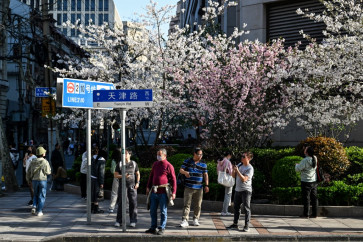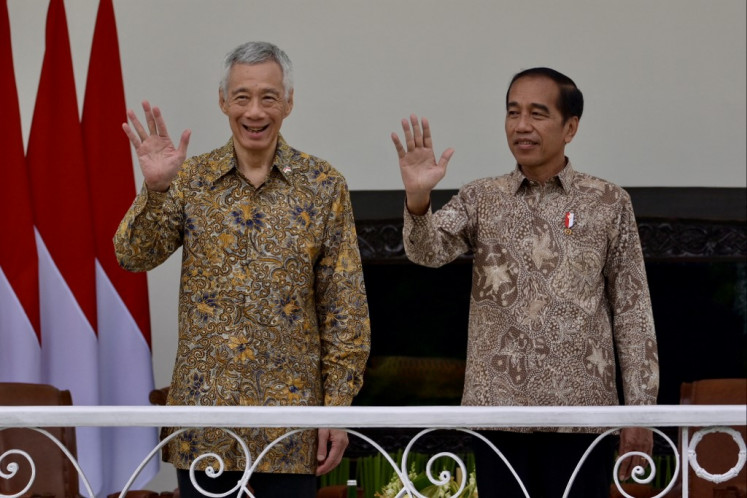Stakeholders unite under local wisdom to protect Tapanuli Orangutan
Sacred animal: A Tapanuli orangutan looks down from its perch in the Batang Toru Ecosystem, its natural habitat
Change Size

S
acred animal: A Tapanuli orangutan looks down from its perch in the Batang Toru Ecosystem, its natural habitat. The local people believe that orangutans are sacred and that disturbing them will bring a blight on human settlements.
Paya, a 40-year-old male Tapanuli orangutan, has spent almost two months in rehabilitation for malnutrition as well as injuries to his face and back at the Orangutan Batu Mbelin quarantine center in Sibolangit, Deli Serdang regency, North Sumatra.
Paya is the only Tapanuli orangutan among the 56 Sumatra orangutans at the center managed by Yayasan Ekosistem Lestari (YEL), an environmental conservation non-profit, and is the first recorded case of malnutrition in a Tapanuli orangutan. He will spend the rest of his life in captivity despite his improving condition, because he is considered too old to survive in the wild.
A team from the Natural Resources Conservation Center (BKSDA) found Paya suffering from malnutrition and several injuries in September at a plantation outside the Batang Toru Ecosystem.
A species of great ape, the Pongo Tapanuliensies has an estimated population of only 800 animals in the wild. They are found only in the Batang Toru Ecosystem, a virgin forest covering 133,841 hectares across the three North Sumatra regencies of South Tapanuli, North Tapanuli and Central Tapanuli.
The people who live around Batang Toru are committed to protecting this most recently discovered orangutan species by relying on local wisdom.
Koesnadi Wirasaputera, a community empowerment activist in Sipirok, South Tapanuli, said that using local wisdom in the community’s approach to environmental conservation and protection had been working so far in the area, including the Tapanuli orangutan’s natural habitat.
He added that the people of Sipirok had been applying the local wisdom to protect the orangutan through the generations since the 18th century.
According to Koesnadi, the people in the villages of Haonatas, Tanjung Rompa, Bonan Dolok and Siranap around Batang Toru believed that disturbing orangutans would put their villages in peril.
“The people of these villages regard orangutans as sacred animals that could endanger their settlements if disturbed," he told The Jakarta Post during a recent interview.
Koesnadi, who is training 30 residents from nine villages as conservation volunteers, also noted that according to ancestral myths, orangutans were seen as “part of the family who lived together” in the same forest area.

The villagers thus felt no enmity toward orangutans, and would only drive the animal off if they ate the fruits from their durian trees. This form of human-orangutan contact still occurred in the hamlets of Sitandiang, Aek Batang Paya and Marancar Godang.
Meanwhile, Firman Taufick, the communications and external affairs director of PT North Sumatra Hydro Energy (NSHE), expressed his appreciation for the local people in applying their customary wisdom to protect the Tapanuli orangutan.
Firman said that NSHE and the government had provided a variety of training programs based on local wisdoms to develop groups of conservation volunteers in South Tapanuli. The programs had been running for several months, and intended to protect orangutans and other animals in the Batang Toru Ecosystem.
“We hope the local people will have the sufficient knowledge and skills to contribute to ensuring the survival of Tapanuli orangutans in Batang Toru,” he said.
NSHE senior adviser for environment and sustainability Agus Djoko Ismanto said that the Batang Toru hydropower plant (PLTA) had been implementing measures to mitigate the potential environmental impacts from the project’s development.
Agus said that these measures included an environmental and social impact assessment (ESIA) as the reference for implementing the PLTA’s Biodiversity Action Plan, an environmental protection and conservation program.
He added that the Biodiversity Action Plan was developed and placed under the supervision of the BKSDA in cooperation with PLTA Batang Toru and local NGOs before land was acquired for the plant.
“We monitored the presence of animal species before we started cutting down trees. Paddy fields were [also] protected to prevent damage during the construction of the PLTA Batang Toru,” said Agus.
Chief researcher Wanda Kuswanda at the Aek Nauli Environment and Forest Research and Development Center (BP2LHK) said that over his 15-year research on the Batang Toru Ecosystem, he had found that the development of PLTA Batang Toru had not disrupted the Tapanuli orangutan population.
Wanda said that the PLTA Batang Toru site covered a mere 122 ha compared to the 130,000-ha orangutan habitat in the Batang Toru Ecosystem. In addition, the site did not encroach on the orangutan’s habitat, and was located in a preexisting area of community plantations.
“Only five to eight orangutans have ever [inhabited] the site of the hydropower plant,” Wanda said.
— Photos by JP/Apriadi Gunawan









